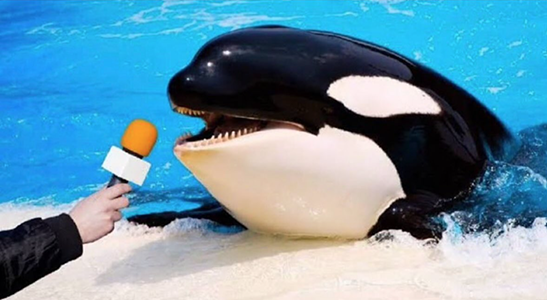— by Kelly Rose —
Orcas Food Co-op and The Exchange presented the film “Bag It” at the Orcas Island Library on Monday, November 14. This was the first in a free-film series called “Kick the Plastic Habit” focusing on the effects of plastics and chemicals on our personal and planetary health, and what we can do about it. Organizer Regina Zwilling describes “Bag It” as “A fun and lighthearted look into something which is actually very serious.” She adds, “It’s also important to offer solutions, to connect this information with how we make choices day to day.”
The film, produced and directed by Suzan Beraza, follows self-proclaimed “average guy” Jeb Berrier from his choice to stop using plastic grocery bags – the #1 consumed plastic worldwide – to his investigation into how large and multifaceted the plastics problem really is. He introduces his journey, “Just because plastic is disposable, it doesn’t mean it goes away. After all, where is away? There is no away. So I started looking at the way it pollutes… the way it flies and floats and drifts and clogs and entangles. The way we can’t escape it any more.”
But the world adores plastic because it’s lightweight, great for containing and shipping, and easy to mold it into tools, trinkets, and toys. So, Berrier asks, “Why does it matter that we can’t escape it? What’s wrong with plastic?”
The film tells us why. Plastic is made from petrols and an amalgam of toxic chemicals. These chemicals, such as phthalates and bisphenol-A, are linked to cancer, hormonal diseases, even autism. They get into our bodies through plastic water bottles, makeup, personal care products, air freshener, vinyl, baby toys and bottles, food packaging, and are multiplied as they accumulate in the seafood we eat. And plastic doesn’t biodegrade, it photo-degrades. Sunlight breaks it down into smaller pieces that further disperse into our environment and the food chain.
It drifts into gutters, rivers, and waterways, ultimately concentrating in five massive oceanic gyres where currents swirl together. These great confluences of currents across the planet, infused with plastic garbage, range from twice the size of Texas to the size of the entire United States. Algalita Marine Research Foundation reports that plastic-to-plankton ratios have gone from 6 to 1, to as high as 40 to 1 in the past several years. Plankton is the foundation of the marine food chain and produces an estimated half of our planet’s oxygen.
The film also takes us to the northern islands of the Hawaiian archipelago, where beaches are covered in over a foot of plastic debris. The debris entangles wildlife, or resembles and intermixes with food for many marine species. Autopsy results from whales, sea turtles, and seabirds show stomachs filled with plastic bags, bottle caps, cigarette lighters, and bits of plastic products we use everyday.
When Berrier and his wife discover they are pregnant, they wonder how all this will affect their baby’s health and future. After an experiment in which he lives a typical American life not avoiding plastics, food microwaved in plastic, his blood tests showed phthalates and bisphenol-A levels increased 53 and 110 times respectively.
Yet plastic is all around us, all the time. The United States uses 3 million disposable coffee cups (which are lined with plastic) each day, and 2 million plastics bottles every 5 minutes. We package everything in plastic. It takes 17 million barrels of oil per year to make all those water bottles. Berrier poses the irony of creating something made from oil, which takes at least 65 million years to form, only to use it for 5 minutes, yet the “disposable” item is with us forever..
And so, posits the film, with more plastic produced in 2010 than in the 1900s together, how do we end the age of plastics?
Berrier explores recycling as part of the solution, and learns that the recycling symbol isn’t regulated. Many items aren’t truly recyclable yet marketing leads us to think otherwise. And often recyclables are shipped to Asia to be hand-sorted by workers who are exposed to toxins daily. Do recycle, but do other things as well.
Some good news: even against strong pushback from oil and chemical industries, plastic bags are being banned in many places around the globe. This is a start. While continued legal action seems to make a difference we also need to make personal changes.
[Editor’s Note: San Juan passed an ordinance banning plastic carryout bags on October 25, 2016. The ordinance will take effect May 1, 2017.]
“Bag It” suggests we re-evaluate the concept of single-use disposable. One solution is in product design using the “cradle to cradle” concept: designing everything so that we can see the next life in it, so the next product it will become is in the design.
The takeaway action items are:
- Bring your own coffee cup, bag, water bottle, and brain.
- Rethink what and how you buy things. Buy less, buy used.
- Recycle, but don’t be lulled into thinking it is the solution.
- Get active in your community and push back against chemical and grocers associations who resist alternatives to plastic.
- Be informed, and do something with that information.
Berrier ends with “I’m still an average guy, but even average people can make changes… it all comes down to common sense.”
The film series will continue through fall and winter, open to the community. Form more information, visit the Orcas Food Co-op and/or The Exchange.








Good call to action. What are some of the “resistant” organization that we could “lobby”?
Would be interested in any updates when available.
Reduce and Reuse, thank you for this important reminder. Recycling comes AFTER reducing and reusing our STUFF! And, Bravo to our Coop and the Exchange for starting this film series. Kelly Rose, great writing and editing. Now, if we the people can simply remember to always bring our own reusable basics, like we have made the change to bringing our own reusable shopping bags, then there might be hope yet for bigger changes that require a critical mass of citizens. Start by always carrying your own coffee cup and “spork” to work, school, shopping, all public events. Next, take the time to ask the producers/shop owners of our take-home-purchases to reduce/eliminate packaging. Then tackle other sustainable issues in your community. Start with ourselves and our daily lives!
Paper bags are not greener than plastic, when you look at the full cradle-to-grave impact of both paper and plastic, you see both have significant impact on the environment. In other words, partner, it’s basically a draw. Let’s cancel the duel and ride off into the sunset– reusable bags in hand of course.
Totally agree with this effort to reduce plastic. I might add that, although I would love to trade in my truck for a hybrid or electric car (one charged by solar at home) it would not make any impact if someone just purchases my truck and drives it. The same with new “green” construction. As in the auto industry the impact on our planet has already been made. Metals, chemicals, dirty power et al have expressed themselves in the production. The greenest building is the one that has already been built. Of course we should try to improve the efficiency of existing structures. The solution is to drive less and not fall into the consumer trap of allowing marketing to convince us we need more things.
This is an important topic and we need to keep talking about how we make it better. Reduce and reuse are definitely the best steps. Drive less, walk more. Buy less, talk more.
Please join us on November 28th for another free movie at the Library, 5:30 pm. this time we will show the movie “Chemerical”: Chemerical is a shocking tale about the products we use to clean our homes and bodies. The film is at once humorous, as we watch the Goode family try to turn a new leaf by creating and living in a toxic free home, and informative, as director Andrew Nisker works with experts to give audiences the tools and inspiration to live toxic free.
Every little step counts. Plastics and toxins are everywhere. Let’s learn how to minimize their presence and their impact. All of us making small changes equals big wins for our planet and our health. Please join us to learn how we can make a difference together!